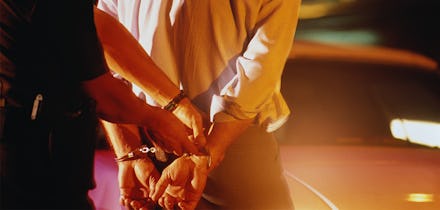Police Took $16K of "Drug Money" From an Innocent Man Because of Random Things in His Car

When California farmer Lorenzo Ayala went to Montana to buy tractor parts with cash, he probably thought he was being fiscally prudent. But after an unexpected run-in with an armed man, reports the Casper Star Tribune, Ayala found himself $16,000 poorer.
But the man who took his money wasn't a criminal. He was a police officer.
The Montana Highway Patrol took Ayala's money under a procedure called civil forfeiture in which law enforcement agencies seize property they claim to suspect is part of a criminal operation.
What law did he break? While it was true Ayala's license was suspended and his license plates had expired, what really got the attention of the officer involved was the random clutter and litter in the car: "A single key in the ignition, a bag of beef jerky, a bottle of Visine, cologne, lighters, clothing stored in plastic grocery bags and trash littered throughout the car."
Law enforcement officers claimed this melange of random items, none of which are illegal, were enough evidence Ayala was either traveling long distances as part of a drug-smuggling operation or attempting to mask the scent of narcotics. They didn't have any evidence to actually charge him with a crime.
But a district judge sided with police and Ayala's $16,000 went into police pockets. According to the Casper Star Tribune, that's just part of the $172,000 in drug forfeiture funds the Montana Highway Patrol has spent since 2013.
Is this legal? Yes, it's totally legal. According to the Institute for Justice, Montana only requires police to demonstrate "probable cause" when taking money from people like Ayala. Unfortunately for people like Ayala, that definition can be interpreted very loosely, meaning a lot of money is seized through civil forfeiture.
But civil forfeiture is happening everywhere. While Montana is one of the few states to have even considered reforming its civil forfeiture laws (the state now requires that someone has been convicted of a crime before any funds can be kept permanently), the practice is disturbingly common across the country.
Originally intended as a crime-fighting tool to hurt kingpins, incidents of civil forfeiture against low-level offenders or even completely innocent people in states have been recorded in states such as Michigan, Pennsylvania, California and Iowa. Bogus or insufficiently convincing charges are subsequently dropped, but the money stays with the police.
In many cases, police deliberately coordinate stings to rake in as much money as possible. Sometimes they target people they know can't fight back.
The Des Moines Register reported on a 2014 case in which two California gamblers had $100,020 in winnings snatched during a routine traffic stop because they looked "nervous." That same year, the New York Times obtained a tape of Las Cruces, New Mexico, city attorney Harry S. Connelly Jr. referring to potential seizures as "little goodies" and explicitly coaching police on the most valuable types of goods to nab from offenders.
Other seminars with state and local prosecutors, as reported by the New York Times, included sessions where advisors gave police "tips on maximizing profits," informing them how to defeat "the objections of so-called 'innocent owners' who were not present when the suspected offense occurred," and "mocked Hispanics whose cars were seized."
The cost of civil forfeiture: In September 2014, the Washington Post reported the Department of Justice program to coordinate civil forfeitures on federal highways had generated close to 62,000 highway stops worth more than $2.5 billion in assets since 9/11 — and those were just the ones "without search warrants or indictments." The Washington Post also found "298 departments and 210 task forces have seized the equivalent of 20% or more of their annual budgets since 2008."
In some cases, as Last Week Tonight's John Oliver pointed out during a segment on civil forfeiture, police forces have been known to collect this money and spend it on practically whatever they want.
Civil rights advocates, constitutional conservatives, libertarians and progressives should all agree: Police theft of peoples' property shouldn't just be illegal. It's morally wrong. Americans cannot afford police that act like the mob.